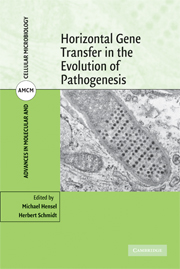Preface
Published online by Cambridge University Press: 16 September 2009
Summary
During the past 25 years, a nearly exponential increase has occurred in nucleotide sequences available from databases. The first microbial genomes were published in 1995 (Fleischmann et al., 1995; Fraser et al., 1995; Himmelreich et al., 1996); the NCBI database currently contains 534 complete bacterial chromosome sequences. The genomes have been determined not only from different species, but also from different strains of the same species. This has paved the way for comparative genomics and has allowed detailed analysis of genetic differences between strains (Wren, 2000; Dobrindt and Hacker, 2001; Edwards, Olsen, and Maloy, 2002; Raskin, Seshadri, Pukatzki, and Mekalanos, 2006). Since infectious diseases are a major health threat worldwide and range among the most frequent causes of death worldwide (WHO Health Statistics 2006), it is not surprising that the first two organisms to be sequenced were pathogenic bacteria.
During the past decade many attempts have been made to understand the molecular basis of microbial pathogenicity, and our knowledge has advanced quickly, in particular through the use of methods of cellular biology, genomics, and proteomics. Various events in the pathogenesis of microbial infections, such as adherence to and entry into human and animal host, invasion of host cells, toxin production, establishment and dissemination of bacterial populations in the host, and the role of the host immune system, have been studied in detail for many host-pathogen interactions.
- Type
- Chapter
- Information
- Horizontal Gene Transfer in the Evolution of Pathogenesis , pp. xi - xivPublisher: Cambridge University PressPrint publication year: 2008



